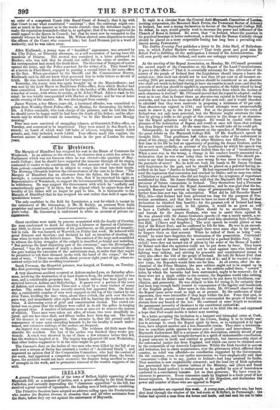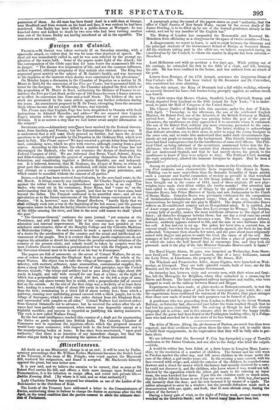IRELAND.
A general Protestant petition of the town of Belfast, highly approving of the Maynooth Bill, as a measure of justice, and a peace-offering to the Irish Roman Catholics, and earnestly deprecating the "clamorous opposition" to the bill, has received a great number of signatures; the leading men of both parties combining. The Primitive Seceders have adopted an address calling upon the Presbyterians who receive the Begium Doman to abandon that and all other assistance from the State, before they cry out against the endowment of Maynooth. In. reply. to a circular from the Central Anti-Ifaynooth Committee of Lomb% inviting cooperation, the Reverend Mark Perrin, the Protestant Rector of Athanry. in Ireland, has sent a strong declaration in favour of the Maynooth College Bill Itr defeat, he says, would greatly tend to increase the power and influence of the Church of Rome in Ireland. He avers that "in Ireland, where the question in its practical bearings is better understood, a desire that the Roman Catholic clergy should be placed on a more respectable footing has long been a prevailing sen- timent among Protestants." The Dublin Evening Post publishes a letter to Dr. John Sheil, of Ballyshan- non in which Father Mathew writes—" That truly great and good man Sir Robert Peel is fulfilling all the anticipation I formed of his Administration. He will soon pacify and calm Ireland, and make our unhappy country prosperous."
At the meeting of the Repeal Association, on Monday, Mr. O'Connell presented. the second report of the Committee on the Report of the Land Commissioners-
It.goes to this effect—" That it is essentially necessary for the alleviation of the misery of the people of Ireland that the Legislature should impose a heavy ab- sentee-tax; that such tax should not be less than 10 per cent on all incomes ex- ceeding 2001. per annum- that every person should be considered as an absentee who shall not reside in Ireland during at least six months in each year; and that the proceeds of such tax should be applied in augmentation of the funds raised by local" taxation for useful objects connected with the districts from which the income of such absentees is derived." Mr. O'Connell moved that the report be adopted : and he went on to say, that in former times an absentee-tax existed in Ireland for many centuries and was no less than one-third of the rent-roll; and it would therefore be admitted that they were moderate in proposing a minimum of 10 per cent. That absentee-tax expired in 1781; and several attempts were unsuccessfully, made to renew it, up to the year 1800. But at the present crisis the voice of Ireland was not only more potential, but the Minister 'night entertain the idea that by giving a bribe to the people of this Country in the shape of an absentee- tax the Repeal agitation could be stopped. He would be candid with those planners of the destruction of Repeal, and would at once tell them that nothing less than Repeal would do. At the same time, he would take all he could get. Subsequently, he proceeded to comment on the speeches of Ministers during the great debate on the Maynooth College Bill. Of Mr. Goulburn's speech he thought little. That gentleman bad taken out the value of the endowment in abuse of the clergy; but the tone of the other Ministers was different. For the first time in his life he had an opportunity of praising Sir James Graham, and he did so now most cordially, on account of the manliness by which his speech was characterized. There was nothing more foolish than the cry of "inconsistency." When a man was in the wrong, a change in his conduct merely amounted to a. declaration that he was wiser today than he was yesterday. Who should pre • sume to say that because a man was once wrong he was never to emerge from the precincts of error? No; be held out both his hands to Sir James Graham. with forgiveness for the post, and he should be placed on a pedestal having in- scribed on its base "Justice to Ireland." He had expressed his sorrow for having used the expression that concession had reached its limits; and no man was either a Christian or a gentleman who did not forgive after the symptoms of repentance manifested by him. Sir James Graham said that the Maynooth Bill was but the precursor of future concessions to Ireland. They themselves had a Precursor Society before they formed the Repeal Association, and he was glad that the ho- nourable Baronet had arrived at the stage of precursorship; all they wanted further from him now was his subscription. What did he tell Recorder Shaw? Why, this—that Ireland had been governed too long for the purposes of Pro- testant ascendancy, and that they were to have no more of that. Now, for that declaration he thanked him heartily; for the greatest evil of Ireland load been- Protestant ascendancy; and, in his opinion, it would be as great an evil-- to have a Catholic ascendancy. There should be no ascendancy, then; and hurrah for Sir James Graham, who was to assist them against it. He was pleased with Sir James Graham's speech—it was a manly speech, a re- pentant speech; and he thought they should send him absolution from Concilia- tion Hall. (Cheers and laughter.) The next speech he would glance at was that of Sir Robert Peel; and he confessed he felt for him. He was m an exceed- ingly awkward predicament; and although there were some slips in his speech, he forgave them on that account When he talked of them as being " con- victed," he must have forgotten the termination of the prosecution. Convicted! why, angels out of heaven might be convicted by a packed Dublin Jury. Con- victed! were they not turned out of prison by the order of the House of Lords? Sir Robert said that the agitation could not be put down by force. They knew that well; they knew that force could not be used against men who instead of fighting were talking, and striving by peaceable and constitutional means to carry into effect the will of the people of Ireland. He told Sir Robert Peel that he might now take every soldier in Ireland out of it; and if he wanted a volun- teer corps, the Repealers would form one for him. At all events, after the de- claration of the Prune Minister, the poor soldiers ought not to be eooped up in. their barracks; and the eyelet-holes, or, as the soldiers- called them, " coward" holes, by which the barracks had been surrounded, ought to be removed; for id there were not a single soldier in the country, the Reperders would take nothing, by force. But Sir Robert said that they were to be put down by kindliness, con- ciliation, and generosity. He was obliged to him for trying it, for certainly they had been long enough badly treated in consequence of the bigotry and fanaticism. of the English people. After more in this strain, Mr. O'Connell observed that. the Repeal cause never stood so high as at present. By the confession of their opponents, they were irresistible if they kept within the law. From that spot, in the name of the sacred cause of Repeal, he commanded the people of Ireland to abstain from any breach of the law. Ho continued at some length to inculcate the paramount necessity of obedience to the constituted authorities.
Mr. O'Connell announced the amount of rent to be 855/.19s. 6d.; and expresso& a hope that Peel would double it before next meeting.
In a letter accepting the invitation to a banquet and triumphal entry at Cork, Mr. O'Connell saya---" The Ministers of the Crown, finding it to be totally use- less to attempt to crash the Repeal spirit by force, or to extinguish it by legal form, have adopted another and a less blameable course. They show a determina- tion to conciliate public opinion by minor acts of justice and benevolence. The- Maynooth Endowment Bill is a measure of this description, entirely devoid of any obnoxious provisions, and brought forward in a spirit of statesmanlike conciliation.. A good measure in itself, and entitled to gratitude, but immeasurably. short of the substantial justice due from England, and which can never be obtained save by the restoration of our domestic Legislature. Whilst the Irish brooded in sorrow and irritation, but in silent acquiescence, over the grievances which afflicted their country, no relief was afforded—no conciliation suggested by the Government On the contrary, even in our earlier movements we were emphatically told that concession '—that is to say, justice to Ireland—had long attained its limits.. That assertion is now emphatically retracted; and the loud cry of Irish agitation has penetrated into the interior cabinet of the Ministry, and (force and fraud having been found useless) is endeavoured to be quelled by acts of benevolence- conferred in a conciliatory manlier. Let us then persevere. We have every in- citement to persevere. Every concession made by England is a fresh proof of her former injustice. It increases the strength of the Repealers, and diminishes the power and number of those who are opposed to Repeal."
Three murders are reported this week. A young man, a farmer's son, has been shot dead through the window of his bed-room at Killyfurt, in Fermanagh: the father had ejected a man from the house and lands, and had sent his son to take posiession of them.. An old man has been found dead in a mill-dam at Grange, near Headford; and from wounds on his head and face, it was evident he had been murdered. One Ruddy has been killed in a public-house at Westport: he was knocked down and kicked to death by two men who had been turning another man out of the house, Ruddy not having interfered at all in the squabble. The murderers are in custody.



























 Previous page
Previous page